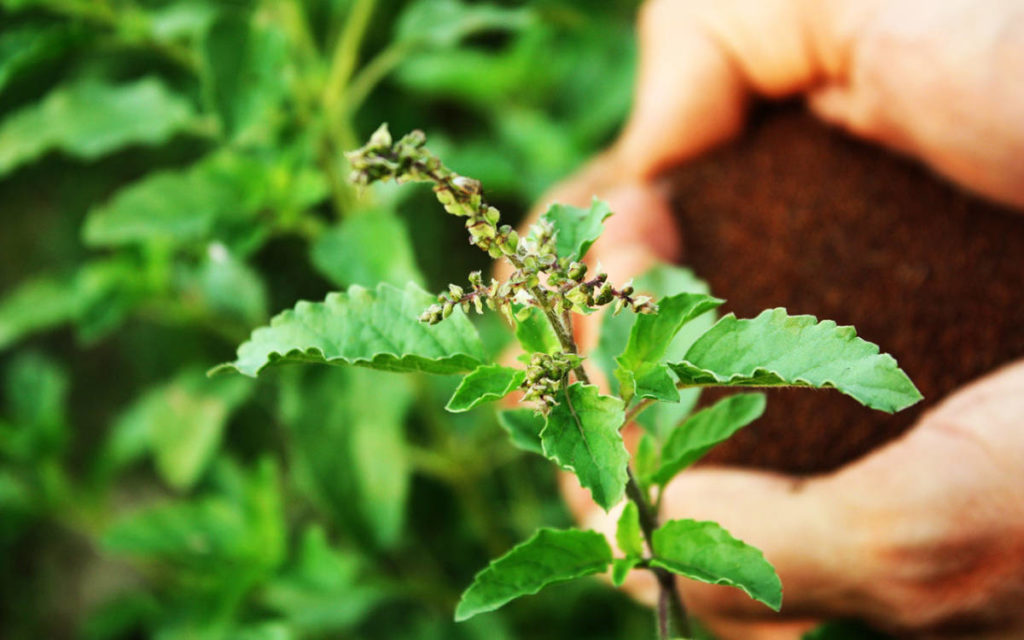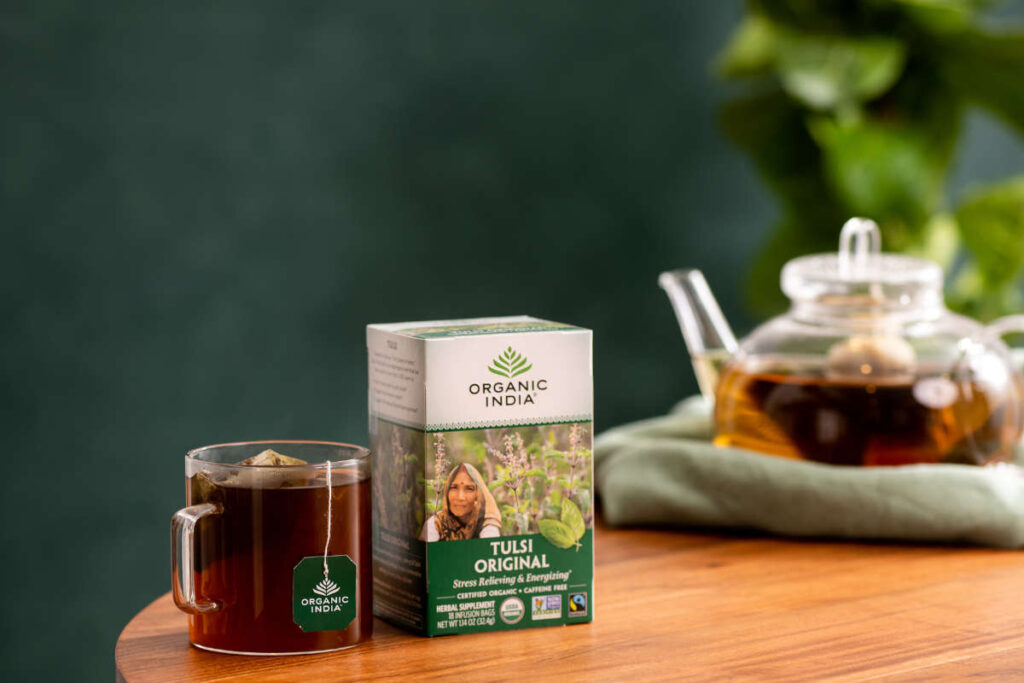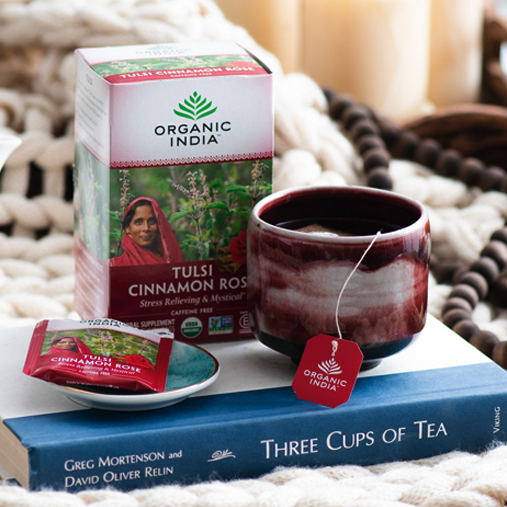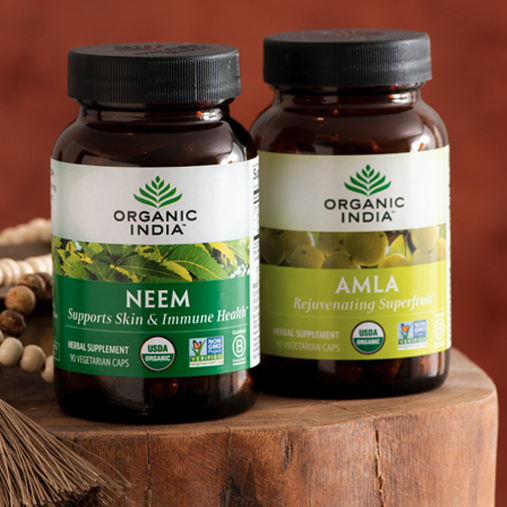Back
Tulsi tea is one of Ayurveda’s most precious elixirs for promoting health and resilience, and Tulsi tea benefits extend to the body, mind, and even spirit.
Considered a sacred plant throughout India, its name in Sanskrit, “Tulsi”, means “holy basil.”
It’s also known as “the incomparable one,” “the queen of herbs,” and “the elixir of life.” It is used in temples and shrines to purify energy; in homes for protection from illness, toxins, and evil spirits; and in Hinduism, it is considered the threshold between heaven and earth.
Tulsi is also loaded with active plant compounds that have been proven to support the body’s defenses, promote healthy energy, and nourish the digestive, immune, and metabolic systems.
In this article, we’ll dive into the science behind Tulsi tea’s many health benefits for the body, mind, spirit, and the environment.
Why is Tulsi a must-drink herbal tea?
Herbal tea infusions are an incredible way to enjoy the benefits of various plants while bringing a sense of mindfulness, harmony, and tranquility to your life.
Although green, white, and black teas are most commonly sought-after in the west, Tulsi is a must-drink herbal tea for those seeking optimal health, an energy boost, environmental protection, spiritual support, and stress relief…all in one.
Why does Tulsi tea work so well in supporting holistic health?
In Ayurveda, Tulsi is considered an adaptogenic herb. Meaning it helps the body adapt and thrive under various physical, mental, and emotional stressors.
It also provides a natural source of energy that brings a sense of alertness and focus without the jitters or crashes of caffeine.
What’s truly remarkable about Tulsi is how its adaptogenic nature makes it valuable, beneficial, and relevant for various modern-day stressors.
Researchers have identified several beneficial constituents of Tulsi, aka Holy Basil. The “top three” being:
- Eugenol: a volatile oil that gives Tulsi its signature sweet-floral scent and is at the core of most research studies.
- Ursolic acid: a triterpenoid that supports the body’s defenses and promotes feelings of calm and well-being.
- Rosemarinic acid: a phenylpropanoid with powerful antioxidant properties.
Other active compounds include caryophyllene and oleanolic acid (terpenes with potent antioxidant effects), carotenoids, vitamin C, calcium, iron, zinc, and chlorophyll.
The bottom line: Tulsi tea benefits are near endless, and provide a wealth of nourishing vitamins, minerals, and plant compounds, while naturally supporting energy, focus, and a strong constitution.

When is the best time to drink Tulsi tea?
Tulsi tea may be enjoyed at various times to support energy, sleep, mood, digestion, immunity, and more.
For example, if you enjoy blending Tulsi with green or black tea as part of your tea ritual (like our Tulsi Breakfast Tea, Tulsi Green, or Tulsi Masala Chai), it’s best enjoyed in the morning.
If you need a little extra digestive support, Tulsi tea or Tulsi Turmeric Ginger can be lovely enjoyed with food or after a meal, combined with mindful eating.
Tulsi Cinnamon Rose is also an excellent choice to support sugar metabolism and digestive fire after a carb-heavy meal or indulgent feast.
You could also enjoy caffeine-free Tulsi tea in the afternoon for a refreshing energy boost. Tulsi Peppermint or Tulsi Breakfast with nootropic herbs are perfect for this.
Or relax with a cup of Tulsi Sleep or Tulsi Honey Chamomile before bed to support your natural sleep cycle.
As you can see, based on these recommendations, Tulsi is beneficial taken on its own or combined with other synergistic herbs like cinnamon, ginger, turmeric, etc. All of which enhance its versatile health benefits.

Five surprising Tulsi tea benefits
In this section, you’ll learn the science and wisdom behind why Tulsi tea has been a spiritual and wellness staple in Ayurveda for centuries.
#1: Soothes stress and tension
As an adaptogen, Tulsi’s superpower lies in its ability to help the body respond and adapt to various stressors.
This is what’s made it a revered staple in Ayurveda for centuries. Through times of feast and famine, war and peace, prosperity and poverty, people have relied on Tulsi for resilience, sustenance, and spiritual strength.
Fast-forward to modern times, and stress has become a contributing factor to nearly every type of chronic disease. Therefore, Tulsi tea remains a valuable tool for anyone interested in supporting their body’s stress response, resilience, and overall well-being.
It works by nourishing the adrenal glands, which control the output of stress hormones like cortisol and adrenaline. When stress hormones are balanced, it gives us a sustained source of energy that powers us through the day and helps us relax at night.
Tulsi is truly an herb for the ages, one that soothes stress and tension no matter what the circumstances.
#2: Uplifts mind and mood
Tea rituals have become popular with younger generations because they promote a sense of calm, presence, and upliftment.
Tulsi is a perfect tea to turn to when you need a little inspiration and positive energy.
Not only will the simple act of preparing the tea help ground you and bring you into the present, but plant compounds in Tulsi have been shown to support a healthy mood and various other aspects of mental/emotional well-being.
It’s also been shown to have a similar effect to yoga for stress relief and promoting focus and clarity of thought.
Expert tip: try enjoying a cup of Tulsi tea pre- or post-yoga and/or meditation to take your practice to a whole new level!

#3: Supports the immune system
Our immune systems are our ultimate guardians at the gate, protecting us from unwanted germs, toxins, and pathogens while keeping our internal organs and systems of detoxification running smoothly.
This is why it’s essential to fortify our immune systems daily with foods, beverages, plants, and lifestyle practices that support its innate capacities.
Ayurveda understands this, which is why most traditional formulas include at least one (and usually more than one) immune-supportive herb.
Tulsi is commonly used for this purpose. In addition to its adaptogenic properties, which help support strong immunity, it’s been shown to have immune-modulating properties (which means it supports a healthy and adaptive immune response).
In traditional Ayurveda, taking Tulsi tea on an empty stomach is typically recommended for maximum immune benefit.
Drinking Tulsi as a tea vs. a tincture can also provide extra support for the sinuses, respiratory and urinary systems.
#4: Promotes detoxification
If you’re looking for a tea that provides multi-level, daily detoxification support, Tulsi cannot be beat.
In addition to its traditional use to promote normal blood purification, it’s been shown effective for supporting key antioxidant enzymes of detoxification, such as superoxide dismutase (SOD) and glutathione, in the liver and kidneys.
Tulsi has been shown in animal studies to support and protect organs of elimination that are critical to removing environmental toxins, such as heavy metals.
But Tulsi tea benefits as they relate to its detoxification prowess extends beyond the human body. It can also be used topically to nurture the skin.
Tulsi has been used to help combat air pollution in cities. And hundreds of thousands of tulsi plants have been planted around the Taj Mahal to help protect it from environmental pollution damage.
#5: Tulsi tea as a spiritual tonic
No tulsi tea benefits list is complete without mentioning its spiritual benefits. Holy basil is used in various rituals to enhance spirituality and help connect body, mind, and spirit.
In Hinduism, for example, Tulsi is worshiped as a goddess, and every part of the tulsi plant is considered sacred. Thus, Hindi households are deemed incomplete without a tulsi plant, which is used in daily rituals and other spiritual, protection, and purification practices.
Tulsi has also been called “liquid yoga” due to its calming and sanctifying effects on the mind and spirit.
By making Tulsi tea a part of your daily self-care or spiritual practices, you also connect yourself with the creative and divine healing power—a much-needed benefit for many of us who reside in cities and suburbs.

Get started enjoying Tulsi tea
Whether you’re just getting started with Ayurvedic herbs or looking to deepen your mind-body practice, Tulsi tea has a place in your wellness routine.
At Organic India, organic, regeneratively-grown Tulsi is what we’re best known for worldwide.
If you’re new to Tulsi, may we suggest the following:
- Tulsi Original—a foundational tea for all occasions.
- Tulsi Green—perfect for mornings and whenever you need a healthy boost.
- Tulsi Sweet Rose—has a delightful, fruity flavor to please any palette.
Or, if you’re looking for a new Tulsi tea experience, try out:
- Tulsi Turmeric Chai—a spicy combination of Tulsi with other Ayurvedic herbs to maximize your defenses.
- Tulsi Ashwagandha—for optimal endurance, stamina, and stress support.
- Tulsi Cleanse—with Katuki, Organic Phyllanthus, Andrographis, and other Ayurvedic herbs to support multi-level detoxification.
New to tea rituals? Check out How To Tap Into The Benefits Of Your Daily Tea Ritual for tips on how to get the most benefits from your Tulsi tea experience.
“Drink your tea slowly and reverently, as if it as the axis on which the world revolves” – Thich Nhat Hanh















